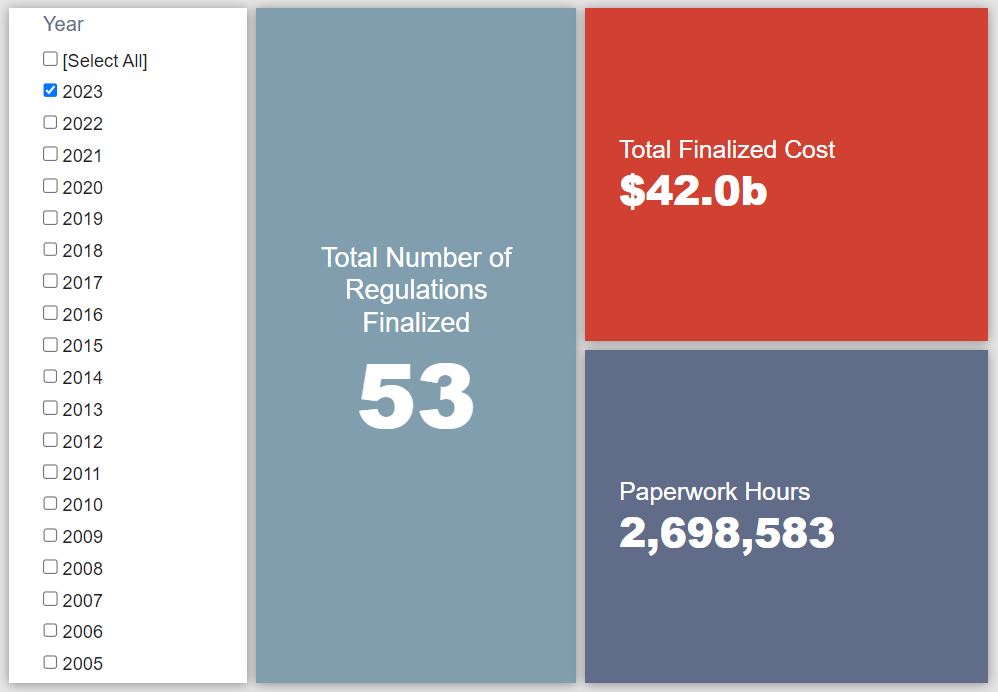Week in Regulation
April 24, 2023
Another Week in the Billions
This past week was a consistently busy one in the pages of the Federal Register. All in all there were 10 rulemakings with some quantifiable economic impact, with multiple actions crossing the billion-dollar threshold in terms of costs. The issues addressed in these rules ranged from health data security measures to safety standards for portable generators. Across all rulemakings, agencies published $4.9 billion in total costs and added 34 million annual paperwork burden hours.
REGULATORY TOPLINES
- Proposed Rules: 34
- Final Rules: 46
- 2023 Total Pages: 24,638
- 2023 Final Rule Costs: $42 billion
- 2023 Proposed Rule Costs: $62.9 billion
NOTABLE REGULATORY ACTIONS
The most significant rulemaking of the week was a proposed rule from the Consumer Product Safety Commission (CPSC) regarding “Safety Standard for Portable Generators.” Specifically, having “determined that there is an unreasonable risk of injury and death associated with acute carbon monoxide” emissions from such devices, CPSC seeks to implement a new standard “that limits CO emissions from portable generators and requires generators to shut off when specific emissions levels are reached.” The Commission estimates that the net costs of these new requirements would add up to nearly $1.8 billion over a 30-year time horizon.
This week’s runner-up in terms of quantified costs was a proposal from the Department of Health and Human Services (HHS) regarding “Health Data, Technology, and Interoperability: Certification Program Updates, Algorithm Transparency, and Information Sharing.” The rulemaking seeks to update the regulatory standards involved with various health information technology (IT) issues. HHS stated that the proposed rule “would fulfill statutory requirements; provide transparency; advance equity, innovation, and interoperability; and support the access, exchange, and use of electronic health information (EHI).” Transitioning toward a more robust health IT framework does, however, bring notable costs. HHS estimates that those costs could add up to approximately $1.3 billion over a 10-year window.
TRACKING THE ADMINISTRATIONS
As we have already seen from executive orders and memos, the Biden Administration will surely provide plenty of contrasts with the Trump Administration on the regulatory front. And while there is a general expectation that the current administration will seek to broadly restore Obama-esque regulatory actions, there will also be areas where it charts its own course. Since the AAF RegRodeo data extend back to 2005, it is possible to provide weekly updates on how the top-level trends of President Biden’s regulatory record track with those of his two most recent predecessors. The following table provides the cumulative totals of final rules containing some quantified economic impact from each administration through this point in their respective terms.
![]()
With most of the week’s action coming on the proposed-rule side the ledger, there was minimal change in the Biden Administration’s final rule totals. Costs and paperwork fell by $68.8 million and 36,657 hours, respectively, with most of those shifts coming from adjustments to a Federal Communications Commission paperwork requirement. There were, however, more dramatic changes in the other two administrations. Trump-era costs decreased by roughly $839 million – driven primarily by a rule involving various aspects of the Medicare program. Meanwhile, a set of energy efficiency standards for clothes dryers and air conditioners drove Obama-era costs upward by roughly $3.3 billion.
THIS WEEK’S REGULATORY PICTURE
This week, the Forest Service opens the floor to public input on how it can better manage the National Forest System.

Source: Photo by Sinjin Thomas on Unsplash
Last Friday, the Forest Service published an advanced notice of proposed rulemaking (ANPRM) regarding “Organization, Functions, and Procedures; Functions and Procedures; Forest Service Functions.” The rulemaking – which at this point primarily focuses on gathering information rather than setting standards – represents an opening salvo in the agency’s efforts “to adapt current policies and management and develop new policies and practices for conservation and climate resilience to support ecologic, social and economic sustainability in light of climate change, human induced changes, and other stressors.” The Forest Service further notes that it is looking for “input on how we can develop new policies or build on current policies to improve our ability to foster climate resilience, recognizing that impacts are different in different places across the country.”
The agency highlights four issues areas that it has a specific interest in addressing. These include:
- “Relying on Best Available Science, including Indigenous Knowledge (IK), to Inform Agency Decision Making”
- “Adaptation Planning and Practices”
- “Mature and Old Growth Forests”
- “Fostering Social and Economic Climate Resilience”
The first item focuses on ascertaining ways the Forest Service can update its data collection practices and underlying scientific assumptions, among other things. The second seeks further input on how “explicit, intentional adaptation planning and practices for climate resilience” must be further incorporated into the agency’s overall management structure. The third point seeks to build upon the directives included in a Biden Executive Order in gathering information regarding older forest sections given their “unique ecological values.” The final item opens the discussion beyond the technical matters in forest management to include considerations “for underserved communities and ensure equitable investments in climate resilience.”
Interested parties have until June 20, 2023, to submit comment.
TOTAL BURDENS
Since January 1, the federal government has published $104.9 billion in total net costs (with $42 billion in new costs from finalized rules) and 47.8 million hours of net annual paperwork burden increases (with 2.7 million hours in increases from final rules).











